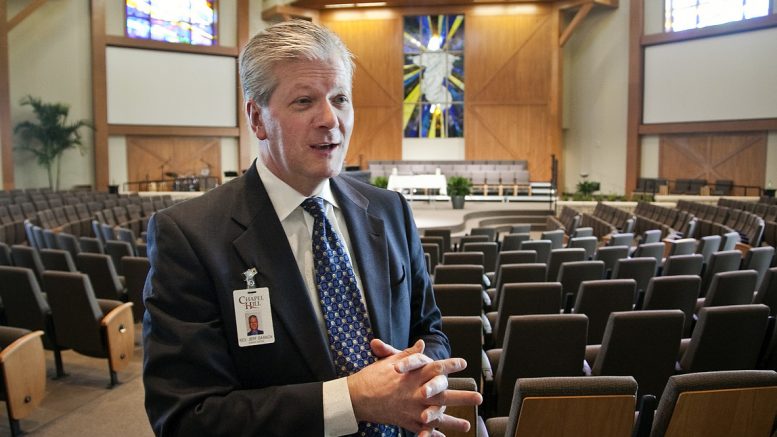A year earlier, he and his family agreed to put their name to one of the most divisive lawsuits in Kansas history. They had gotten a fair share of negative feedback, but nothing like the man who approached him after church.
“He said, ‘Do you have any idea what they can do to you? You are coming up against a system that is incredibly large and powerful,’ ” Gannon said. “He said, ‘Are you prepared for the trouble that could come your way?’”
It was odd, and a bit disquieting, but even after the nameless man left, Gannon wasn’t shaken.
“Frankly, it strengthened my resolve,” he said.
The Methodist pastor is the namesake of the 2010 lawsuit filed on behalf of four school districts claiming that the state inequitably and inadequately funded K-12 education. For years, the litigation thrust Gannon, his wife, Meredith, an art teacher, and their three children into the state and national spotlight. It was difficult at times, but even now, as the lawsuit winds to what all parties hope is an end, Gannon says it was the right thing to do.
“We’re just representing the common Joe,” he said. “The person that is passionate about public education.”
After years of legal jousting, legislators this month passed what they hope will be the solution to education funding problem. It’s now up to the Kansas Supreme Court to decide if it satisfies the state constitution.
Should the justices approve, it will add an extra $90 million a year to the state education budget. But it will have no impact on the academic lives of the Gannon kids. The youngest, Grace, graduated from Wichita schools last year. Luke, 22, is in his final year at Southern Illinois University, where he plays golf. And Drew, 26, works in commercial real estate.
When it was filed, the suit was a source of unwelcome and attention anxiety.
“Luke and Grace at times thought they were living under a microscope in part,” he said. “Teachers and staff would make comments which were often complimentary. However, there were those awkward moments when it was mentioned in front of peers.”
The Gannons made an effort to sequester what they called “the lawsuit drama” from the rest of their lives. They didn’t appear in court. They turned down national television interviews. Jeff Gannon said he made it a point to never preach about it.
“I made it very clear that this is as a parent who happens to be a pastor,” he said. “This is not a pastor who happens to be a parent.”
And the Gannons had always been involved parents.
Since moving to Wichita in 1991, the two had been active in their kids’ schools, serving on site councils and vocally backing a 2008 bond issue.
But by 2010 the state was going through what Gannon saw as an ideological shift. Public education funding was at a historic low, and newly-elected Republican Sam Brownback was promising to slash spending and cut taxes.
“And that’s when District 259 said, well there’s only one way we’re going to be able to fight this tide and that is if we file a lawsuit with these other school districts,” Gannon said. “That’s the point at which they said, ’would you be willing to have your name on it?’”
“And we said, ‘well of course.’”
For proponents of public education, the fight isn’t quite over. State Attorney General Derek Schmidt sent briefs to the court on April 15. Oral arguments are scheduled for May 9.
Even if the court OKs the funding hike, the real challenge, Gannon says, will be making sure that money gets into the hands of those who need it most—teachers and students.
“Is it good? Of course it’s good,” Gannon said. “But if it doesn’t translate into more money into the classroom we have not won.”
Gannon still remembers a time when Heights High School in Wichita ended classes early on hot days because the buildings didn’t have functioning air conditioning.
“We had several classes that were meeting in mop closets,” Gannon recalls. “And we had classes where there were more students than chairs.”
It was a troubling scene for the Gannons, who had been intentional about sending their kids to public schools. They didn’t expect it would land them in the center of a years-long battle for adequate funding.
“We wanted our children to be exposed to the diversity of the Wichita Public Schools,” he said. “Then all of a sudden, the politics began to change and I saw the tide shift towards a more conservative approach to public education.”
Diane Caton, a friend of Gannon’s who spent 12 years as an educator in the Hutchinson USD 308 district, said she saw first-hand the difficulties in making budgetary decisions.
“How agonizing that was for them, to try to decide where they were going to cut to make ends meet. That was one of the things that has stayed with me,” Caton said. “I don’t think I’ve ever watched so many people try to figure out how to keep the students first.”
Over the years of litigation, Caton wondered if lawmakers understood what was going on in public schools—teachers buying their own supplies, administrators doing everything they can to help students.
“Teachers are on the front lines every day,” she said. “And many people have no idea what they face and the challenges that they have.”
The state thought it had fixed the issue last year, when the state supreme court ruled its funding formula constitutional. But there was a catch — the state had failed to account for inflation, the ruling said, and the court sent lawmakers back into deliberation to figure out a solution.
That answer came on April 5, two weeks before the court’s deadline, when lawmakers approved the extra $90 million per year. Democratic Gov. Laura Kelly, who made education funding a cornerstone of her 2018 campaign, signed the bill the next day.
Sen. Molly Baumgardner, R-Louisburg, chair of the Senate Education Committee, said it will still be up to school districts to figure out how best to spend the funding. But if the courts deem the legislation equitable, it’ll lift a tremendous burden off the state of Kansas.
“I do believe that each district is doing the best in trying to focus in on kids being successful,” said Baumgardner,herself a professor at Johnson County Community College. “I think that for some of those stressors to be moved off the table will be very positive for our state.”
It will take years to see the full impact of the funding increases. But one thing is already apparent, Gannon says, and it’s that Kansans are paying attention and willing to fight for public education.
“All of this lawsuit drama, for lack of a better expression, has deepened people’s passion,” Gannon said. “More people are getting involved and that’s why I think Laura Kelly was elected. Because people are tired of this.”
Source: www.kansas.com




